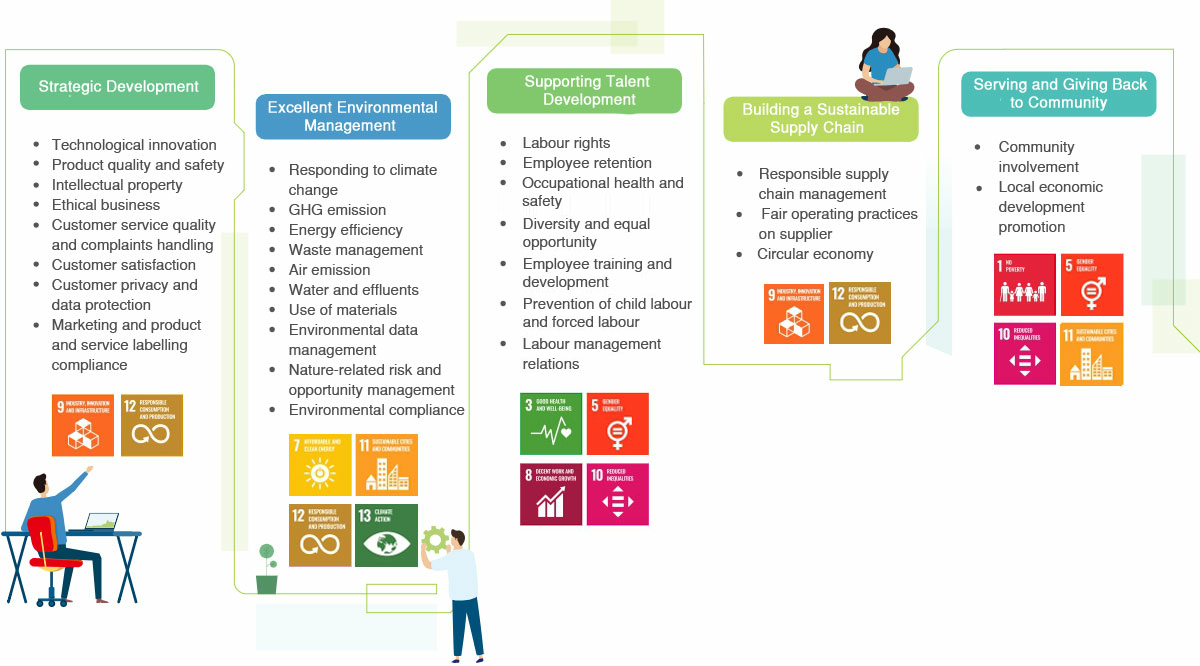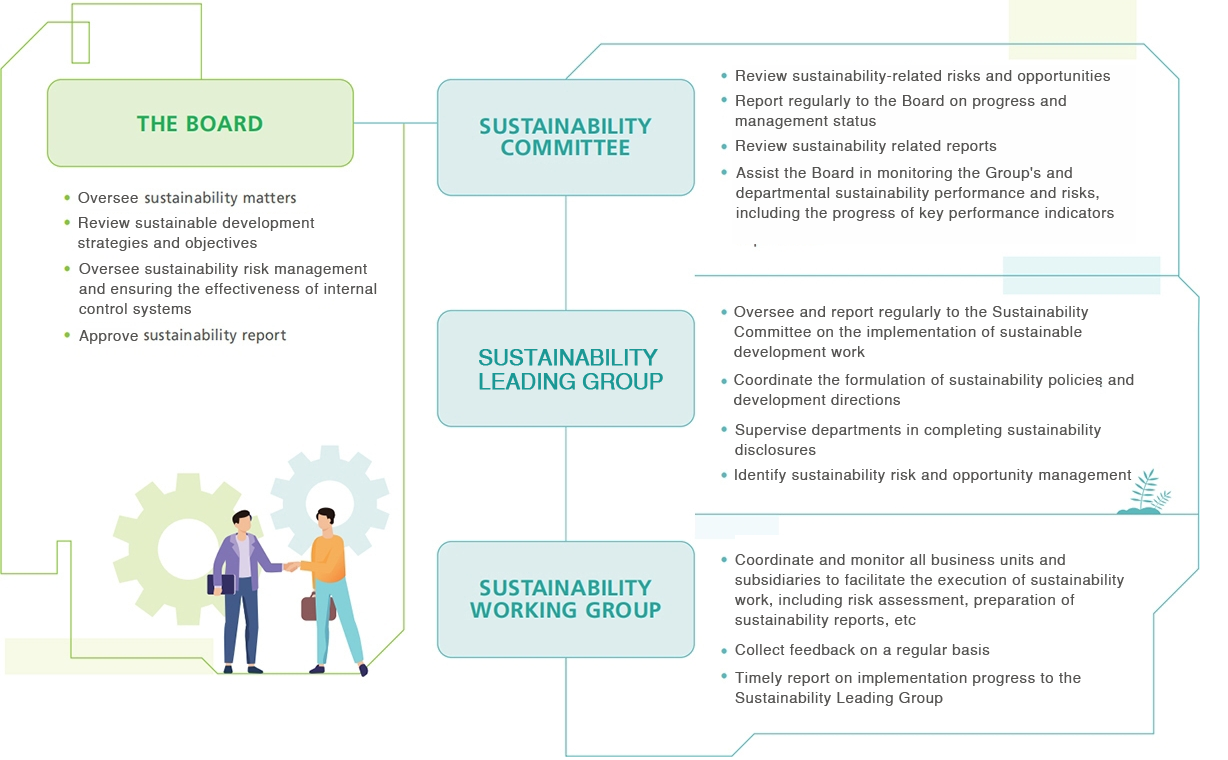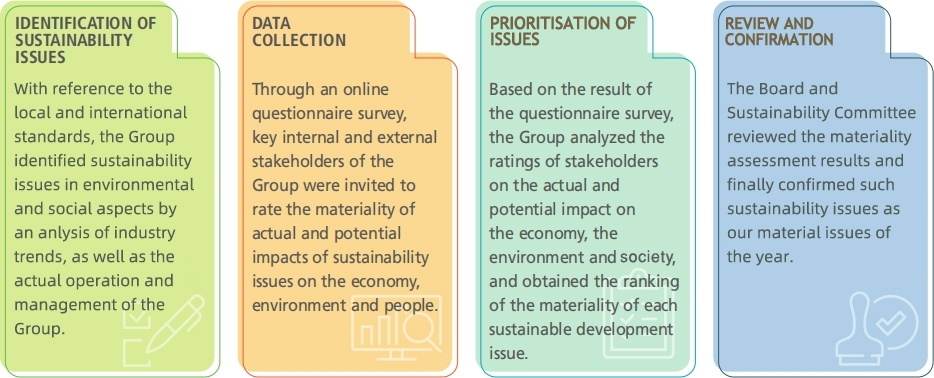Scroll to
Promoting green civilization, upholding sustainable development, and pursuing harmonious development between corporate growth, production, life, and ecological development.
To realise our corporate vision of building a sustainable environment and enhancing the well-being of our stakeholders, we have our sustainability strategy that focuses on five key pillars. For each pillar, we have identified different key focus areas, which show our support for the United Nations Sustainable Development Goals (UNSDGs).

The Group has always been building a better society with innovative thinking and sustainable development ideas. We are committed to integrating innovation and sustainable development into our business, promoting a green business culture, and fulfilling our due environmental and social responsibilities. While we create long-term value for shareholders, we strive to foster harmonious development of both corporate and ecology.
We are committed to:

Minimise the carbon emission of our operations, identify all significant environmental impacts at early stage of our operations and ensure proper control of such impacts.

Comply with all legal requirements and integrate industry best practices in climate change mitigation, climate change adaptation, and climate resilience in the Group's operations and services wherever possible.

Support innovation and technology to continuously improve the quality of our products and services.

Communicate the Group's sustainability policy to suppliers, contractors and business partners, practise sustainable sourcing and prioritise environmentally and socially responsible suppliers.

Create a safe and caring workplace for our employees, strengthen employee training and provide adequate support for employee development.

Improve our environmental performance through employee education and training.

Ensure that workplace activities are conducted in accordance with sound environmental protection rules and regulations.

Care for and support the communities in which we operate to help build sustainable communities. Encourage employees and clients to fulfill good citizenship and give back to the community by conducting volunteering and community engagement activities.
Detailed sustainable development and other related policies can be downloaded for reference
Sustainability Policy
Environmental Policy
Climate Change Policy
Health and Safety Policy
Human Rights Policy
Sustainable Procurement Policy
Code of Conduct for Suppliers
The Board serves as the highest decision-making and supervisory body for the Group's sustainability matters, responsible for providing strategic direction, reviewing strategies and objectives for material issues. The Group ensures that Board members possess the necessary expertise and competencies through the following measures:
• Formulate and implement the Board Diversity Policy, which considers factors such as gender, age, cultural background, educational qualification, experience, knowledge and length of service when nominating Board members, with the Nomination Committee overseeing the implementation of this policy;
• Provide annual sustainability-related training for Board members, covering topics such as latest sustainability trends, disclosure standards and regulatory developments, industry best practices in climate risk and opportunity management, and green finance, etc;
• Engage external experts and consultants when necessary to provide professional advice and guidance to the Board, ensuring scientific rigor and forward-looking perspectives in decision-making.
The Group's Sustainability Committee, appointed by the Board, is chaired by the Executive Director and Chief Financial Officer, with members including the Executive Director and Chief Executive Officer, as well as three Independent Non-executive Directors. The Committee is authorised by the Board to assist in overseeing and managing the Group's sustainability matters and their economic, environmental and social impacts. It is responsible for identifying, evaluating and managing material issues, whilst regularly reporting progress and management status to the Board. The Sustainability Committee also oversees the sustainability performance of both the Group as a whole and individual departments, and approves relevant reports.
To support the work of the Sustainability Committee and coordinate the implementation of sustainability-related initiatives, the Group has established a Sustainability Leading Group and a Sustainability Working Group. The Sustainability Leading Group, comprising senior management from different departments and subsidiaries, is responsible for formulating policies and development directions, as well as monitoring and regularly reporting the implementation status of various initiatives to the Sustainability Committee. The Sustainability Working Group is responsible for coordinating with various business units to drive the execution and implementation of sustainability strategies and action plans, whilst providing timely implementation updates to the Sustainability Leading Group. All relevant departments and subsidiaries actively cooperate with and respond to the sustainability policies and initiatives, ensuring their business operations align with sustainability strategies and action plans.

Understand, review and analyze materiality assessment, risk analysis reports, megatrend report to form a list of potential risks
Define potential relevance and impact of the sustainability risks based on factors such as business context, operation, financial performance etc.
Invite department heads and senior management to assess and prioritize the likelihood and severity of each sustainability risk
Review and monitor the identified issues with high-risk levels to develop or enhance risk management plans
The Group firmly believes that stakeholder feedback and opinions are crucial for achieving sustainable development. As such, the Group not only annually reviews and identifies key internal and external stakeholder categories but also actively maintains effective communication with various stakeholders to promote open and sincere dialogue. During this year, the Group's identified key stakeholder groups, their areas of concern, and communication methods or channels are presented in the table below.

| Stakeholder Group | Stakeholder Concerns | Communication Methods or Channels | |
|---|---|---|---|
| The Board and Management |
|
|
|
| Employees |
|
|
|
| Clients and Property Owners |
|
|
|
| Suppliers and Contractors |
|
|
|
| Shareholders and Investors |
|
|
|
| Peer Enterprises and Partners |
|
|
|
| Media |
|
|
|
| Government |
|
|
|
| Community and the Public |
|
|
|
Each year, the Group engages with internaland external stakeholders through anonline questionnaire to collect theiropinions, which serves as the basis of themateriality assessment. In 2024, with the assistance of an independent consultant, we conducted a materiality assessment through stakeholder questionnaire surveys combined with management focus group discussions. This process thoroughly examined CSC Development's policies and performance on various sustainability issues and their impact on internal and external stakeholders, while also gathering stakeholders’ views and expectations regarding the Group's future development.
Procedures for the materiality assessment are as follows:
